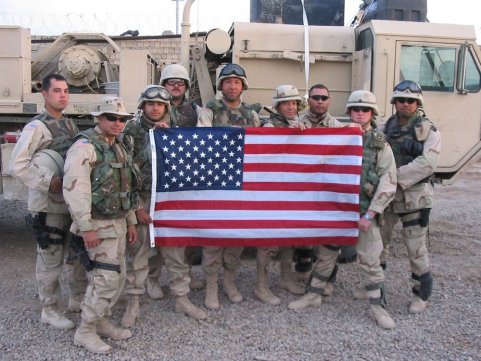
.
Congress Building to Break Promises
Military.com
At a breakfast meeting with a select group of defense reporters at a posh Washington, DC hotel, one of the most vocal members of the Senate Armed Services Committee uttered words likely to strike fear into the hearts of the Army and Marine Corps’ most senior leaders.
No, this was not about the cancellation of a pet weapons system or the repeal of Don’t Ask Don’t Tell. It was about something potentially far worse. Based on the pullout from Iraq and a planned withdrawal from Afghanistan beginning next summer, Sen. Jim Webb — former Navy Secretary and Marine platoon leader in Vietnam — said the Pentagon should plan to hand out pink slips to a fresh crop of Soldiers and Marines who only a year ago joined to service behind the promise of a larger force to meet steadily-building global missions.
“We eventually should and will reduce the size of the Army and Marine Corps as we wind down in Iraq and Afghanistan,” Webb said.
With flags waving and fists thumping in righteous indignation, lawmakers foisted upon the Army and Marine Corps an increase in manpower — about 80,000 overall — in 2007. For years, opponents of the Bush administration’s war policy criticized the Pentagon’s under resourcing of the fight in Iraq, pointing to Soldiers and Marines with back-to-back deployments as victims of a “broken” military and an ill-planned invasion. The way to fix it, Congress argued, was to boost the size of the Army and Marines — the two services doing the bulk of the fighting there.
Despite repeated cajoling from anti-war lawmakers only too happy to show their “support for the troops” by increasing end strength, the service chiefs respectfully declined to take the legislative branch up on its offer, fearing a repeat of the crushing reduction in forces imposed by then-Secretary of Defense Dick Cheney in the waning days of the Cold War. The last thing the service chiefs want to do is hire a bunch of new employees then turn around and fire them without offering a reasonable chance at a career. Congress, naturally, blamed Rumsfeld for the services’ intransigence, claiming he was pressuring the chiefs to deny the need for more troops.
But after years of pressure, the chiefs acceded to lawmakers’ demands and agreed to a modest increase — about 55,000 Army and Guard troops and about 25,000 Marines — that would be fully implemented within three years. That was 2007.
A year later, the economy tanked and recruiting stations were inundated with applicants. The Marine Corps reached its new goal in less than two years and the Army made a year after that. Now those so-called “dwell times” are finally increasing, Chief of Staff Gen. George Casey noted, with Soldiers able to spend an average of two years back home to every one year deployed. What Casey didn’t say, though, was that the dwell time increase had more to do with 100,000 fewer troops deploying to Iraq, than with the 55,000 extra Soldiers Congress had given them.
Yet what Congress giveth, Congress taketh away. With an economy gasping for air, unemployment stuck at 9 percent and a national dept climbing into the trillions, both parties are shifting their sights to savings in the $660 billion defense budget. Fearing a dramatic backlash over the military/civilian “social contract,” lawmakers are loath to raise military health care premiums, cut troop pay, or risk jobs in their districts by cancelling weapons programs.
So guess what, the political capital Congress earned from advocating a larger military during the darkest days of the Iraq war will soon pay for the “domestic investments” they need make to stay in office. According to Army officials, every 10,000 new Soldiers cost taxpayers about $1.2 billion per year.
“We want to compensate our people well, but the end-strength numbers drive costs,” Webb said, expressing what many in Congress think as they look for buckets of money to pay for other “priorities.”
“Do we need this size of our ground forces if we are properly going to reshape our missions in Iraq and Afghanistan?” he added. “I think you can cut back.”
So get ready Generals Casey and Amos. Those bright new faces you brought in with the promise of a military career and a lifetime of service to their country, those new billets you created to meet the demand, and those new facilities you built to house and train them are all about to take a hit. Congress has shifted its ephemeral gaze once again and you’re going to be left in the cold. And remember this broken contract the next time Congress pledges support for the military, not the mission.
.

Wild Thing’s comment……..
Cuts backs will hurt us one day big time, imo. All the spending Congress does on BS things and then they want to cut back on our Armed Forces???? They spent our tax dollars in their stimulus bills to have tattoo’s removed from prisoners and other wasted spending but God forbid they spend money to keep a strong force to protect our country. sheesh
And one more thing, where are the politicans telling how upset they are about the military voting problems. Has anyone heard even ONE politician say anything about this????

Bill Clinton decimated the military to fund his social programs and it looks like it’s going to happen again. When Bush took office, SecDef Rumsfeld said it would take a decade to get the armed forces back to the strength levels of the early 90’s; then 9/11 hit.
What will probably happen is that the number of Active Duty forces will be significantly reduced but the Guard and Reserves will increase.
For a people who are free, and who mean to remain so, a well-organized and armed militia is their best security. Thomas Jefferson
The Federal government plays an ever diminishing role in their Constitutionally mandated obligations. Then massively expands their mischief in areas that they have no business in. I certainly hope the next Congress can right the ship.
Thank you so much.
Jim good point, I sure hope we see that happen with a new Congress.